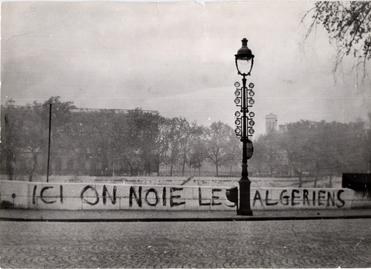The Paris Massacre of 17 October 1961

Sixty years ago today, Algerian migrants around the Paris region gathered for a peaceful march to protest a restrictive and discriminatory curfew. A decree passed on 5 October 1961 required all “French Muslims from Algeria” to stay off the streets between 8:30 pm and 5:30 am; night workers had to petition for special documents to allow them to commute during these hours. Algerian cafés had to close by 7pm, and Algerians were instructed to travel alone and avoid groups.
The tens of thousands of Algerian protesters who filed into the city center on 17 October 1961, including women and children, were met with overwhelming police force. Well over ten thousand participants were arrested and detained (some for weeks). At least one hundred were killed. Both an attempted cover-up and vociferous protest against police methods ensued. As much as Algerian activists and their allies fought to call attention to the atrocities committed on 17 October and the days that followed, the French state has been slow to recognize both the the extent of and official complicity with the violence.
The Pont Saint-Michel first received a commemorative plaque in 2001. The northern suburb of Saint-Denis dedicated a square to the “victims of 17 October 1961” in 2006–its city government had been among the first critics of the police crackdown. Nearby Aubervilliers dedicated a plaque in 2013. Remembrance ceremonies at bridges in Paris and other cities have been promoted by a group dedicated to keeping the memory of the massacre.
This weekend, Emmanuel Macron became the first French president to attend a memorial for those who were killed in October 1961 (his predecessor, François Hollande, took part in a commemoration in 2011 as a presidential candidate). Macron recognized that police repression of the protest was “brutal, violent, and bloody.” His statement however emphasized that these “inexcusable” crimes were “committed that night under the authority of Maurice Papon.”
Papon, as the head of the Paris police, certainly bears a fair share of the blame. His role as villain in 1961 was foreshadowed by his WWII activities: a civil servant in Bordeaux under the Vichy government, Papon deported more than 1500 Jews to their deaths at Auschwitz. A French court found Papon guilty of crimes against humanity in 1998; revelations of his activities in 1961 came out during the trial but were not part of his sentence.
But Papon-blaming is a version of the “few bad apples” argument (Pa-pomme-isation?) we often hear when demanding broader police reforms. The idea that a singular evil individual perverted an otherwise healthy system hardly holds up.
Throughout the Algerian War of Independence (1954-1962), North African migrants on the French mainland had been subjected to a series of repressive measures. Police relied on racial profiling, on frequent raids, and on special and auxiliary forces. The French state relied on torture in both Algeria and France itself. The government also launched a welfare campaign partially run through the police that sought to cultivate pro-French sympathies even as it extended surveillance and control operations into housing, employment, and health services. Those programs became the bedrock of the French immigration system in the years after decolonization. Papon was as much a product of the French imperial system as he was a perpetrator of its crimes. October 1961 was a terrible escalation of police violence, but it was far from occurring in a vacuum.
Moreover, Papon was long gone from law enforcement when Zyed Benna and Bouna Traoré died while fleeing from police in 2005–triggering three weeks of riots and a return to the state-of-emergency measures first developed during the Algerian War. Papon himself died before the police car struck and killed Moshin Cehhouli and Lakami Samoura in 2007 (bringing two more days of riots). Papon was certainly not to blame when Adama Traouré died in police custody in 2016, launching a protest movement analogous to #BlackLivesMatter.
If we are to learn anything from 17 October 1961 in Paris, let it be this: discrimination and disproportionate force are foundational to state power and–as convenient as it may be to blame the especially flagrant violators of public trust–we the public must recognize how deep and pervasive racist and imperialist ideologies remain on our streets today.
